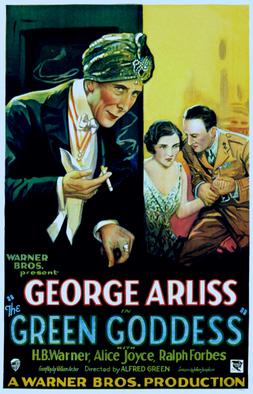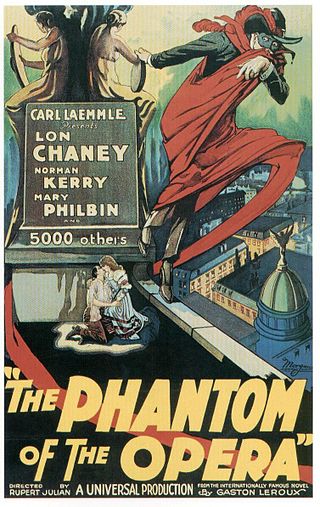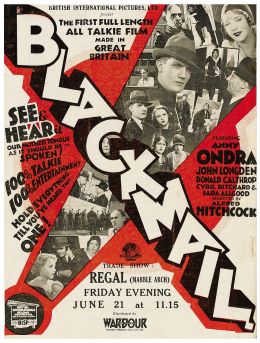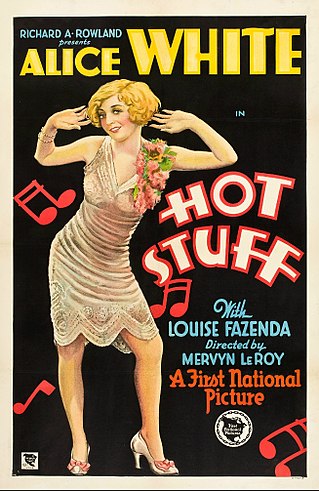
The Green Goddess is a 1930 American pre-Code film directed by Alfred E. Green. It was a remake of the 1923 silent film, which was in turn based on the play of the same name by William Archer. It was produced by Warner Bros. using their new Vitaphone sound system, and adapted by Julien Josephson.

The Phantom of the Opera is a 1925 American silent horror film adaptation of Gaston Leroux's novel of the same name directed by Rupert Julian and starring Lon Chaney in the title role of the deformed Phantom who haunts the Paris Opera House, causing murder and mayhem in an attempt to make the woman he loves a star. The film remains most famous for Chaney's ghastly, self-devised make-up, which was kept a studio secret until the film's premiere. The picture also features Mary Philbin, Norman Kerry, Arthur Edmund Carewe, Gibson Gowland, John St. Polis and Snitz Edwards. The last surviving cast member was Carla Laemmle (1909-2014), niece of producer Carl Laemmle, who played a small role as a "prima ballerina" in the film when she was about 15 years old. The film was released on September 6, 1925, premiering at the Astor Theatre in New York. Vaudeville stars Broderick & Felsen created a live prologue for the film's Broadway presentation at the B.S. Moss Colony Theater beginning on November 28, 1925. The film's final budget was $632,357.

Jacqueline Alice Irene Newlin, professionally known as Alice Day, was an American film actress who began her career as one of the Sennett Bathing Beauties.

Blackmail is a 1929 British thriller directed by Alfred Hitchcock and starring Anny Ondra, John Longden, and Cyril Ritchard. Based on the 1928 play of the same name by Charles Bennett, the film is about a London woman who is blackmailed after killing a man who tries to rape her.

Dorothy Dunbar Lawson was an American actress and socialite, who appeared in silent movies in the 1920s.

Mary Brian was an American actress who made the transition from silent films to sound films.

Reginald Leigh Dugmore, known professionally as Reginald Denny, was an English actor, aviator, and UAV pioneer.

James Cruze was a silent film actor and film director.

Rock-A-Bye Baby is a 1958 American musical comedy film starring Jerry Lewis. A loose remake of Preston Sturges' film The Miracle of Morgan's Creek (1944), the film was directed and written by Frank Tashlin, and features Marilyn Maxwell, Connie Stevens and Reginald Gardiner.

Showgirl in Hollywood is a 1930 American pre-Code all-talking musical film with Technicolor sequences, produced and distributed by First National Pictures, a subsidiary of Warner Bros. The film stars Alice White, Jack Mulhall and Blanche Sweet. It was adapted from the 1929 novel Hollywood Girl by J.P. McEvoy.

Madam Satan or Madame Satan is a 1930 American pre-Code musical comedy film in black and white with Multicolor sequences. It was produced and directed by Cecil B. DeMille and starred Kay Johnson, Reginald Denny, Lillian Roth, and Roland Young.
The New Alice in Wonderland is a 1966 American animated television special written by Bill Dana and produced by Hanna-Barbera. It was broadcast on the ABC network on March 30, 1966, in an hour slot. The songs were written by composer Charles Strouse and lyricist Lee Adams, who were most famous for Bye Bye Birdie. The songs were orchestrated by Marty Paich, who also provided musical direction; plus devised and arranged that part of the underscoring that was drawn from the musical numbers. The rest of the underscoring was drawn from the vast library of cues that Hanna-Barbera's in-house composer Hoyt Curtin had written for various animated series.

Alma Bennett was an American film actress of the silent era. She appeared in more than 60 films between 1919 and 1931.

The Canary Murder Case is a 1929 American pre-Code crime-mystery film based on the 1927 novel of the same name by S.S. Van Dine. The film was directed by Malcolm St. Clair, with a screenplay by Wright, Albert Shelby LeVino, and Florence Ryerson. William Powell starred in the role of detective Philo Vance, with Louise Brooks co-starred as "The Canary"; Jean Arthur, James Hall, and Charles Lane also co-starred in other principal roles.

What Happened to Jones is a 1926 American silent comedy film directed by William A. Seiter and starring Reginald Denny. It was produced and distributed by Universal Pictures. The film is based on the 1897 Broadway play What Happened to Jones by George Broadhurst.

Hot Stuff is a 1929 American sound part-talkie comedy film directed by Mervyn LeRoy and written by Robert S. Carr, Humphrey Pearson and Louis Stevens. In addition to sequences with audible dialogue or talking sequences, the film features a synchronized musical score and sound effects along with English intertitles. The sound was recorded via the Vitaphone sound-on-disc process. The film stars Alice White and features Louise Fazenda, William Bakewell, Doris Dawson, Ben Hall and Charles Sellon. The film was released by First National Pictures on May 5, 1929.

Show Girl is a 1928 American synchronized sound comedy-drama film starring Alice White and Donald Reed. While the film has no audible dialog, it was released with a synchronized musical score with sound effects using the sound-on-disc Vitaphone process. The film was based on the first of J. P. McEvoy's two Dixie Dugan novels, as was the 1929 musical. It was followed by a sequel, Show Girl in Hollywood (1930).

Clear the Decks is a 1929 American sound part-talkie comedy film directed by Joseph Henabery and written by Earle Snell, Gladys Lehman, Albert DeMond and Charles Henry Smith. In addition to sequences with audible dialogue or talking sequences, the film features a synchronized musical score and sound effects along with English intertitles. The soundtrack was recorded using the Western Electric sound-on-film system. The film is based on the 1926 novel When the Devil Was Sick by E.J. Rath. The film stars Reginald Denny, Olive Hasbrouck, Otis Harlan, Lucien Littlefield, Collette Merton and Robert Anderson. The film was released on March 3, 1929, by Universal Pictures.

His Lucky Day is a 1929 American sound part-talkie comedy film directed by Edward F. Cline and written by John B. Hymer, Gladys Lehman and Albert DeMond. In addition to sequences with audible dialogue or talking sequences, the film features a synchronized musical score and sound effects along with English intertitles. The soundtrack was recorded using the Western Electric sound-on-film system. The film stars Reginald Denny, Lorayne Duval, Otis Harlan, Eddie Phillips, Cissy Fitzgerald and Harvey Clark. The film was released on June 2, 1929, by Universal Pictures.

William H. Turner (1861–1942) was an Irish stage and film actor who appeared in a number American films during the silent era as a character actor. Born in Cork he was educated at a seminary in Liverpool.



















